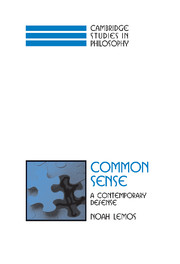Book contents
- Frontmatter
- Contents
- Acknowledgments
- Preface
- 1 The Common Sense Tradition
- 2 Common Sense and Reliability I
- 3 Common Sense and Reliability II
- 4 Reid, Reliability, and Reid's Wrong Turn
- 5 Moore, Skepticism, and the External World
- 6 Chisholm, Particularism, and Methodism
- 7 Common Sense and A Priori Epistemology
- 8 Particularism, Ethical Skepticism, and Moral Philosophy
- Conclusion
- Selected Bibliography
- Index
7 - Common Sense and A Priori Epistemology
Published online by Cambridge University Press: 22 August 2009
- Frontmatter
- Contents
- Acknowledgments
- Preface
- 1 The Common Sense Tradition
- 2 Common Sense and Reliability I
- 3 Common Sense and Reliability II
- 4 Reid, Reliability, and Reid's Wrong Turn
- 5 Moore, Skepticism, and the External World
- 6 Chisholm, Particularism, and Methodism
- 7 Common Sense and A Priori Epistemology
- 8 Particularism, Ethical Skepticism, and Moral Philosophy
- Conclusion
- Selected Bibliography
- Index
Summary
In this chapter, I consider some views about the nature of a priori knowledge and justification and their relationship to the common sense tradition. I do so for three reasons.
First, some philosophers have both adopted a common sense approach to the theory of knowledge and held that some epistemic principles are knowable a priori. Can one consistently do both? Whether one can consistently do both depends on the nature of a priori knowledge and justification. Some accounts of a priori justification, such as Chisholm's, treat basic a priori justification as certain and indefeasible. But this gives rise to what we may call “the problem of insulation.” If epistemic principles are instances of basic a priori beliefs, and if basic a priori beliefs are indefeasible and thus cannot be reasonably rejected when they conflict with particular epistemic judgments, then how can particular epistemic beliefs be data for assessing those principles? The epistemic principles would be “insulated” from criticism from the standpoint of our particular epistemic beliefs, and that would be an unhappy result for the common sense particularist.
Second, it is worth thinking about the nature of a priori justification and knowledge because of the role that a priori justification, or claims to a priori justification, play in philosophical thought. Many philosophers have claimed that various metaphysical, epistemological, and moral claims are knowable a priori.
- Type
- Chapter
- Information
- Common SenseA Contemporary Defense, pp. 135 - 156Publisher: Cambridge University PressPrint publication year: 2004



